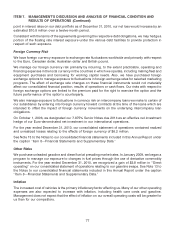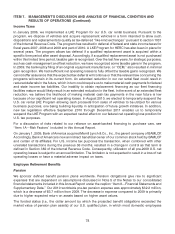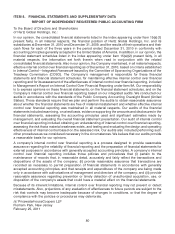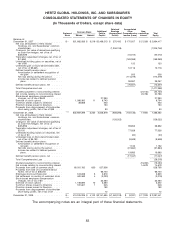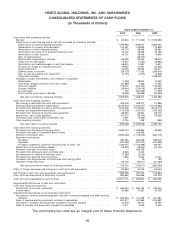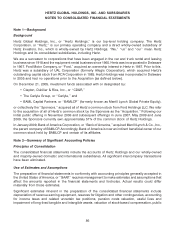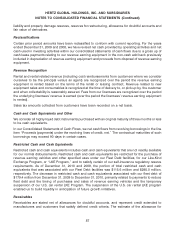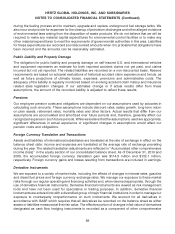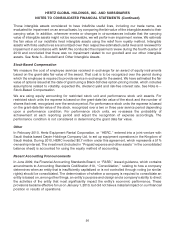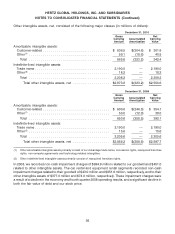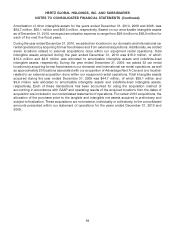Hertz 2010 Annual Report Download - page 110
Download and view the complete annual report
Please find page 110 of the 2010 Hertz annual report below. You can navigate through the pages in the report by either clicking on the pages listed below, or by using the keyword search tool below to find specific information within the annual report.HERTZ GLOBAL HOLDINGS, INC. AND SUBSIDIARIES
NOTES TO CONSOLIDATED FINANCIAL STATEMENTS
Note 1—Background
Background
Hertz Global Holdings, Inc., or ‘‘Hertz Holdings,’’ is our top-level holding company. The Hertz
Corporation, or ‘‘Hertz,’’ is our primary operating company and a direct wholly-owned subsidiary of
Hertz Investors, Inc., which is wholly-owned by Hertz Holdings. ‘‘We,’’ ‘‘us’’ and ‘‘our’’ mean Hertz
Holdings and its consolidated subsidiaries, including Hertz.
We are a successor to corporations that have been engaged in the car and truck rental and leasing
business since 1918 and the equipment rental business since 1965. Hertz was incorporated in Delaware
in 1967. Ford Motor Company, or ‘‘Ford,’’ acquired an ownership interest in Hertz in 1987. Prior to this,
Hertz was a subsidiary of UAL Corporation (formerly Allegis Corporation), which acquired Hertz’s
outstanding capital stock from RCA Corporation in 1985. Hertz Holdings was incorporated in Delaware
in 2005 and had no operations prior to the Acquisition (as defined below).
On December 21, 2005, investment funds associated with or designated by:
• Clayton, Dubilier & Rice, Inc., or ‘‘CD&R,’’
• The Carlyle Group, or ‘‘Carlyle,’’ and
• BAML Capital Partners, or ‘‘BAMLCP’’ (formerly known as Merrill Lynch Global Private Equity),
or collectively the ‘‘Sponsors,’’ acquired all of Hertz’s common stock from Ford Holdings LLC. We refer
to the acquisition of all of Hertz’s common stock by the Sponsors as the ‘‘Acquisition.’’ Following our
initial public offering in November 2006 and subsequent offerings in June 2007, May 2009 and June
2009, the Sponsors currently own approximately 51% of the common stock of Hertz Holdings.
In January 2009, Bank of America Corporation, or ‘‘Bank of America,’’ acquired Merrill Lynch & Co., Inc.,
the parent company of BAMLCP. Accordingly, Bank of America is now an indirect beneficial owner of our
common stock held by BAMLCP and certain of its affiliates.
Note 2—Summary of Significant Accounting Policies
Principles of Consolidation
The consolidated financial statements include the accounts of Hertz Holdings and our wholly-owned
and majority-owned domestic and international subsidiaries. All significant intercompany transactions
have been eliminated.
Use of Estimates and Assumptions
The preparation of financial statements in conformity with accounting principles generally accepted in
the United States of America, or ‘‘GAAP,’’ requires management to make estimates and assumptions that
affect the amounts reported in the financial statements and footnotes. Actual results could differ
materially from those estimates.
Significant estimates inherent in the preparation of the consolidated financial statements include
depreciation of revenue earning equipment, reserves for litigation and other contingencies, accounting
for income taxes and related uncertain tax positions, pension costs valuation, useful lives and
impairment of long-lived tangible and intangible assets, valuation of stock-based compensation, public
86



